|
|
|
Sort Order |
|
|
|
Items / Page
|
|
|
|
|
|
|
| Srl | Item |
| 1 |
ID:
137722
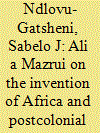

|
|
|
|
|
| Summary/Abstract |
Ali A Mazrui’s academic and intellectual fame provoked both deep admiration and severe criticism, causing his intellectual legacy to be caught up between what the South Sudanese scholar Dustan M Wai depicted as ‘Mazruiphilia’ (hagiographical celebration) and ‘Mazruiphobia’ (critical bashing). Mazrui died on 12 October 2014, leaving behind a ‘supermarket of ideas’ and a rich archive that easily immortalises him. This article aims to transcend both Mazruiphilia and Mazruiphobia through the adoption of an approach which avoids a sententious orientation while critically engaging with Mazrui’s contributions to the topical questions of the invention of Africa, Africanity and the African condition. From Mazrui’s ‘supermarket of ideas’ the article takes one of the debates in his expansive work – that of Africanity – as its departure point to engage with his contribution to African Studies and pay tribute to this African intellectual giant.
|
|
|
|
|
|
|
|
|
|
|
|
|
|
|
|
| 2 |
ID:
134074
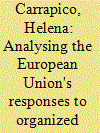

|
|
|
|
|
| Publication |
2014.
|
| Summary/Abstract |
In the past 30 years, organized crime (OC) has shifted from being an issue of little, or no concern, to being considered one of the key security threats facing the European Union (EU), the economic and political fabric of its society and its citizens. The purpose of this article is to understand how OC has come to be understood as one of the major security threats in the EU, by applying different lenses of Securitization Theory (ST). More specifically, the research question guiding this article is whether applying different ST approaches can lead us to draw differing conclusions as to whether OC has been successfully securitized in the EU. Building on the recent literature that argues that this theoretical framework has branched out into different approaches, this article wishes to contrast two alternative views of how a security problem comes into being, in order to verify whether different approaches can lead to diverging conclusions regarding the same phenomenon. The purpose of this exercise is to contribute to the further development of ST by pointing out that the choice in approach bears direct consequences on reaching a conclusion regarding the successful character of a securitization process. Starting from a reflection on ST, the article proceeds with applying a "linguistic approach" to the case study, which it then contrasts with a "sociological approach". The article proposes that although the application of a "linguistic approach" seems to indicate that OC has become securitized in the EU, it also overlooks a number of elements, which the "sociological approach" renders visible and which lead us to refute the initial conclusion.
|
|
|
|
|
|
|
|
|
|
|
|
|
|
|
|
| 3 |
ID:
131624


|
|
|
|
|
| Publication |
2014.
|
| Summary/Abstract |
European Union (EU) interventions in conflict countries tend to focus on governance reforms of political and economic frameworks instead of the geopolitical context or the underlying power asymmetries that fuel conflict. They follow a liberal pattern often associated with northern donors and the UN system more generally. The EU's approach diverges from prevalent governance paradigms mainly in its engagement with social, identity and socio-economic exclusion. This article examines the EU's 'peace-as-governance' model in Cyprus, Georgia, Palestine and Bosnia and Herzegovina. These cases indicate that a tense and contradictory strategic situation may arise from an insufficient redress of underlying conflict issues.
|
|
|
|
|
|
|
|
|
|
|
|
|
|
|
|
| 4 |
ID:
104968
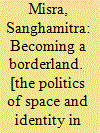

|
|
|
|
|
| Publication |
New Delhi, Routledge, 2011.
|
| Description |
xiv, 236p.
|
| Standard Number |
9780415612531, hbk
|
|
|
|
|
|
|
|
|
|
|
|
Copies: C:1/I:0,R:0,Q:0
Circulation
| Accession# | Call# | Current Location | Status | Policy | Location |
| 056097 | 305.8009541/MIS 056097 | Main | On Shelf | General | |
|
|
|
|
| 5 |
ID:
131907
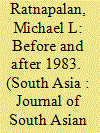

|
|
|
|
|
| Publication |
2014.
|
| Summary/Abstract |
This paper discusses the material effects of the theorisation of the contemporary Sri Lankan Tamil diaspora around the 1983 Colombo riots. In the complicated aftermath of the end of the Sri Lankan civil war in 2009, it is necessary to rethink the way in which diasporic history has been constructed in order to factor in its multiple dimensions and underlying dynamics. By critically foregrounding the key literature on the Sri Lankan Tamil diaspora, which is definitive to understanding the history of Sri Lankan Tamil emigration around the 1983 riots, the modern diaspora can be framed anew by longer and more diverse historical perspectives.
|
|
|
|
|
|
|
|
|
|
|
|
|
|
|
|
| 6 |
ID:
074753
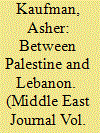

|
|
|
|
|
| Publication |
2006.
|
| Summary/Abstract |
This article follows the fate of the only seven Shi'i villages in Mandatory Palestine, beginning in the time of the border demarcation between Palestine and Lebanon (1919-1924) and concluding with Hizbullah's demand to retrieve their territories back to Lebanon (2000). The article examines the relations of the villages with the Jewish Yishuv and with the Sunni population in Palestine during the British Mandate; their fate as Palestinian refugees in Lebanon; and their status in Lebanon after the 1994 naturalization law that granted them Lebanese citizenship. The story of the seven villages is examined through three prisms: that of the villages themselves, of the Palestinians, and of the Lebanese. The different narratives enlighten themes such as the colonial legacy in the Middle East, border dynamics, identity formation, and internal Lebanese politics.
|
|
|
|
|
|
|
|
|
|
|
|
|
|
|
|
| 7 |
ID:
151022


|
|
|
| 8 |
ID:
048186
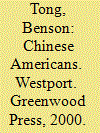

|
|
|
|
|
| Publication |
Westport, Greenwood Press, 2000.
|
| Description |
xiv, 248p.hbk
|
| Series |
New Americans Series
|
| Standard Number |
0313305447
|
|
|
|
|
|
|
|
|
|
|
|
Copies: C:1/I:0,R:0,Q:0
Circulation
| Accession# | Call# | Current Location | Status | Policy | Location |
| 042833 | 973.04951/TON 042833 | Main | On Shelf | General | |
|
|
|
|
| 9 |
ID:
166620
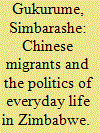

|
|
|
|
|
| Summary/Abstract |
While there has been a rapid migration of Chinese nationals to Zimbabwe following the ‘Look East’ policy, there has been little research on and about how the Chinese migrants relate and interact with locals and how they negotiate their social identities thereof. This paper examines Chinese small-scale traders in Harare, in particular their mundane forms of the everyday, with specific focus on their social and business practices, social relations and interactions with the locals. Drawing on qualitative ethnographic research with small-scale Chinese traders, workers and clients in Harare, this paper argues that as Chinese traders devise and deploy various tactics and strategies to adapt and get-by in the city of Harare, new and unique forms of Chineseness emerge akin to what some scholars referred to as ‘tactical cosmopolitanism’. The paper further reveals how Chinese mobility reconfigures the ways in which Chinese identities and Chineseness are enacted and articulated in Harare.
|
|
|
|
|
|
|
|
|
|
|
|
|
|
|
|
| 10 |
ID:
088907


|
|
|
|
|
| Publication |
2009.
|
| Summary/Abstract |
This article analyses the relationship between civil society and conflict. It aims to provide an analytical framework to unpack this complex relationship and assess the impacts which civil society may have on conflict. In a first section, it analyses the implications of context on civil society, namely the implications that statehood, democracy, nationalism, development and international presence have on the nature of civil society. In the second section it examines more specifically the role of civil society in ethno-political conflicts, or as we rename it 'conflict society'. The final section turns to the identification of different factors determining the impact of civil society on conflicts, including political identities, frameworks of action and political opportunity structures in which civil society actors operate. Accordingly, the different combinations of these determinants lead to the formation of civil society actors and ensuing actions that can either fuel conflict, sustain the status quo, or build peace
|
|
|
|
|
|
|
|
|
|
|
|
|
|
|
|
| 11 |
ID:
134332
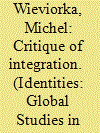

|
|
|
|
|
| Summary/Abstract |
The term ‘integration’ is a category used both in political discourse and in sociological analysis. In political discourse, in the public debate, it has become a magic word which accompanies repression when a political power is unable to deal with major difficulties, particularly in poor neighbourhoods. The so-called ‘models of integration’ are all failing, whether in the United Kingdom after the terrorist attacks of 2005, in the Netherlands after the murder of Theo Van Gogh and Pim Fortuyn, or in France after the riots of 2005. In political and social life, integration is far from able to account for realities or to implement public policies successfully. From a sociological perspective, integration is connected with approaches which are centred on society or the social system, much more than with those that deal with the subjectivity of individuals and their capacity for personal or collective action. This means that integration belongs much more to traditional sociological thinking than to the new contemporary sociological imagination.
|
|
|
|
|
|
|
|
|
|
|
|
|
|
|
|
| 12 |
ID:
176081
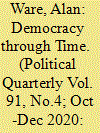

|
|
|
|
|
| Summary/Abstract |
Since the 1980s identities have re‐emerged as a powerful factor shaping support for specific public policies, often doing so at the expense of prioritising the interests of future generations. Outside the United States a major causal factor has been the declining ability of many political parties to mobilise support for themselves and their policies. Consequently, considerations derived from the past can be at the expense of future citizens. This article analyses two major policies separated by a century—Prohibition in the US and Brexit. With both, the enacted policies featured limited previous public discussion about their likely consequences. Moreover, in both cases it was a ‘hard’ version that would be enacted, even though some supporters had favoured more moderate policy options. While not all policies driven by support from particular identities harm future generations, some do. This results from politicians in public utterances previously being insufficiently focussed in detail on the policy’s consequences.
|
|
|
|
|
|
|
|
|
|
|
|
|
|
|
|
| 13 |
ID:
163780
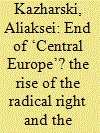

|
|
|
|
|
| Summary/Abstract |
The article analyses the effects of the migration crisis and the parallel rise of right wing parties on national and regional identities in Slovakia and the broader subregion of the Visegrad Four. It argues that the recent right wing political discourse around migration has been reshaping the meaning of ‘Central Europe’ as a normative project and an identity shared by the V4 countries. The post-Cold War narrative of Central Europe was a story of ‘returning to the West’, which in practice meant that normative conformity with the West was a precondition of membership in key Western institution. The situation has changed visibly after the migrant crisis, as the V4 political elites have now been constructing new identities, in partial juxtaposition with Western European liberalism. These new identities favour a culturalist, conservative interpretation of the nation and reject humanitarian universalism, epitomized by the European Union’s decision to welcome the refugees. This arguably devaluates the previous notion of ‘Central Europe’ as a region that seeks to identify itself firmly with the West. Slovakia is chosen as a case study because of the recent success of the radical right in the 2016 parliamentary elections. The article concludes that although the situation of being structurally locked into the EU does not allow the V4 countries to openly challenge its main principles, the V4 political elites pursue a counter-hegemonic strategy, subverting and resignifying some of its key political notions. One should, therefore, speak not of an end of ‘Central Europe’ but rather of its evolution into a new, hybrid stage, where normative conformity and identification with the West will only be partial. The article makes use of Laclau and Mouffe’s theory of discourse and related concepts as well as insights from constructivist geopolitics literature to track articulatory practices of the regional establishments. The study relies on evidence from recent political campaigning in Slovakia as well as official Visegrad Group documents from 2015 to 2016.
|
|
|
|
|
|
|
|
|
|
|
|
|
|
|
|
| 14 |
ID:
096479
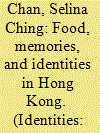

|
|
|
|
|
| Publication |
2010.
|
| Summary/Abstract |
This article adopts a processual and relational approach to study food remembrance and investigates how different ways of appropriating food reveal the politics of identities in Hong Kong. It examines how food memories reveal relationships between the past and the present, reflect epochal transformation, and mark changing identities of various groups of people through new ways of appropriations. It takes the case study of pancai, a special banquet food for the villagers in the New Territories of Hong Kong, to examine the relationships between food and identities. This article investigates how pancai is remembered, popularized, and reinvented with different variations and embodies shifting meanings for the New Territories inhabitants as well as other Hong Kong people in changing socioeconomic and political environments. Pancai has been imbued with multiple layers of significance, involving linkages between local and national, emigration and Chineseness, urbanization and rural heritage, as well as decolonization and identity politics. As identities are by nature negotiable, situational, and fluidic, pancai's multiple layers of meanings correspond to different levels of identities-identities of the New Territories inhabitants, the rest of the Hong Kong people, and the mainland Chinese.
|
|
|
|
|
|
|
|
|
|
|
|
|
|
|
|
| 15 |
ID:
075099
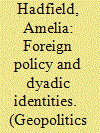

|
|
|
|
|
| Publication |
2006.
|
| Summary/Abstract |
The Common Foreign and Security Policy (CFSP) is a foreign policy tool that continues to defy easy description. It is a focal point of intergovernmental forces protecting their foreign policy-making power and also a forum for increasingly supranational coordination of all member states on EU third-party issues that has bestowed a quality of 'actorness' upon the EU. Introducing the role of identity to judge the national and trans-national tensions inherent in EU foreign policy making, the CFSP is seen to operate as a locale of dyadic identity construction, juxtaposing national and collective forms of self-reference in an effort to produce workable outputs and lend consistency to EU actorness. Following the existential questioning of a post-Constitution EU, common foreign policy making may require alternative approaches to the confines of the CFSP. The use of 'enhanced cooperation' encouraging groups of states to guide EU foreign policy is a possible remedy to the quantitative problems inherent in coordinating twenty-five policy stances and the qualitative attributes that reveal national identity as deeply connected to foreign policy practices.
|
|
|
|
|
|
|
|
|
|
|
|
|
|
|
|
| 16 |
ID:
116830
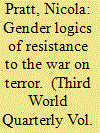

|
|
|
|
|
| Publication |
2012.
|
| Summary/Abstract |
This article asks, 'How are femininities constructed in resisting the "war on terror" and with what implications for women's agency and the conceptualisation of gender?' It examines the under-studied gender logics of non-violent resistance to the 'war on terror' by focusing on a series of conferences held in Cairo, between 2002 and 2008, uniting opposition to imperialism, Zionism, neoliberalism and dictatorship. Whereas much feminist scholarship conceptualises sex-gender difference within patriarchy as the major source of women's subordination, women speakers at the Cairo conferences erased patriarchy as a source of subordination and valorised sex-gender difference as a source of agency in resisting the 'war on terror'. Femininities were constructed against the dominant narratives and practices of the war on terror through the representation of national/religious or class differences. These 'resistance femininities' represent strategically essentialised identities that function to bridge differences and mobilise women against the 'war on terror'.
|
|
|
|
|
|
|
|
|
|
|
|
|
|
|
|
| 17 |
ID:
132270
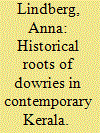

|
|
|
|
|
| Publication |
2014.
|
| Summary/Abstract |
Dowry payments from the family of the bride to that of the groom were rarely encountered in Kerala during the early twentieth century, but now are almost universal. Based on an examination of historical documents, including legislative debates, court cases, and reports, the way dowry was explained in the past is compared with the results of 200 contemporary interviews to determine its current rationale. Nowadays, making an obligatory payment for the maintenance of a wife, adherence to a social norm, and guaranteeing a woman's good treatment have displaced earlier arguments related to inheritance, status in the social hierarchy, or a woman's ability to provide for herself. Although several blurred traditions have been cited to account for dowries, they seem to have flourished in times of social inequity and uncertainty: the 1930s, 1970s, and 1990s. The emphasis on patriarchal nuclear families has created a mentality that a woman must pay for the privilege of being married and living securely.
|
|
|
|
|
|
|
|
|
|
|
|
|
|
|
|
| 18 |
ID:
119234
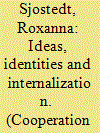

|
|
|
|
|
| Publication |
2013.
|
| Summary/Abstract |
Why do some events take precedence over others in terms of being viewed as security issues? This article argues that in order to answer this question it is necessary to move beyond the assumption that threat images are self-evident. Rather, a distinction should be made between the contextual conditions that may lay the foundation for a threat image and the subjective problem formulation by actors. In addition, in order to analyze how, why, and when an actor constructs a threat image and initiates a so-called securitization process, a broad conceptual and analytical framework should be employed. This article suggests a framework that incorporates ideas and identity at the international and domestic levels, and the internalization processes of the central decision-making unit performing the securitization. The article argues that while the diffusion of ideas by entrepreneurs forms an important basis for the threat constructions of national decision-makers, it is necessary to take the role of national and domestic identities into account in order to explain why some idea diffusion processes succeed while other do not. Identity serves as a catalyst or gate-keeper of idea diffusion. The internalization of the decision-making unit, finally, is a central mechanism that highlights the process between the explanatory factors and the outcome (securitization). By including these three concepts into the analysis, this article takes a holistic approach that can be employed to analyze different kinds of actor-based and non-actor-based threat images.
|
|
|
|
|
|
|
|
|
|
|
|
|
|
|
|
| 19 |
ID:
092180
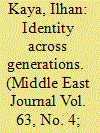

|
|
|
|
|
| Publication |
2009.
|
| Summary/Abstract |
This article explores identity formation across generations among Turkish Americans. The study argues that important differences exist between first and second generation Turkish Americans in regard to the acceptance and assertion of their American and Turkish identities and cultural practices. While first generation Turkish Americans are quite reluctant to assert their American identities, second generation Turkish Americans openly express both their Turkish and American identities, regardless of their religious orientation. Whereas the first generation is more isolated in America no matter the degree of their acculturation, second generation Turkish Americans are much more integrated, as linguistic proficiency and cultural adaptation are less significant barriers to their participation in larger American society. This article also suggests that those second generation Turkish immigrants who feel discriminated against believe that it is their Islamic faith rather than their ethnicity that is the cause of their lack of acceptance by larger American society.
|
|
|
|
|
|
|
|
|
|
|
|
|
|
|
|
| 20 |
ID:
123918


|
|
|
|
|
| Publication |
2013.
|
| Summary/Abstract |
Although researchers have investigated Multiracials for their racial identity 'choices', many scholars continue to conceptualise racial identity as monolithic. This article both problematises and extends the notion of racial identity with an 'identity matrix'. This concept grounds the sociological processes of constructing and deploying a racial identity as strategic and agentic in interactional, political, cultural, physical (embodiment) and institutional contexts. Using insights from survey data from 231 black-white Multiracial young adults and follow-up in-depth interviews with 24 of these respondents, we develop the concept of 'identity matrix' both theoretically and empirically. This article provides heuristic results that we hope will encourage more development of methodological and theoretical complexity in the study of racial identity, allowing scholars to think about the various identities of Multiracials, the possibility of and conditions enabling an emergent Multiracial consciousness, as well as the socio-cognitive structure and active deployment of identity matrices across other social groups.
|
|
|
|
|
|
|
|
|
|
|
|
|
|
|
|
|
|
|
|
|